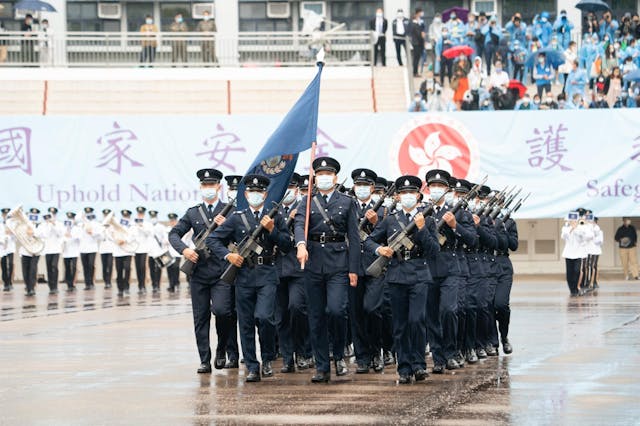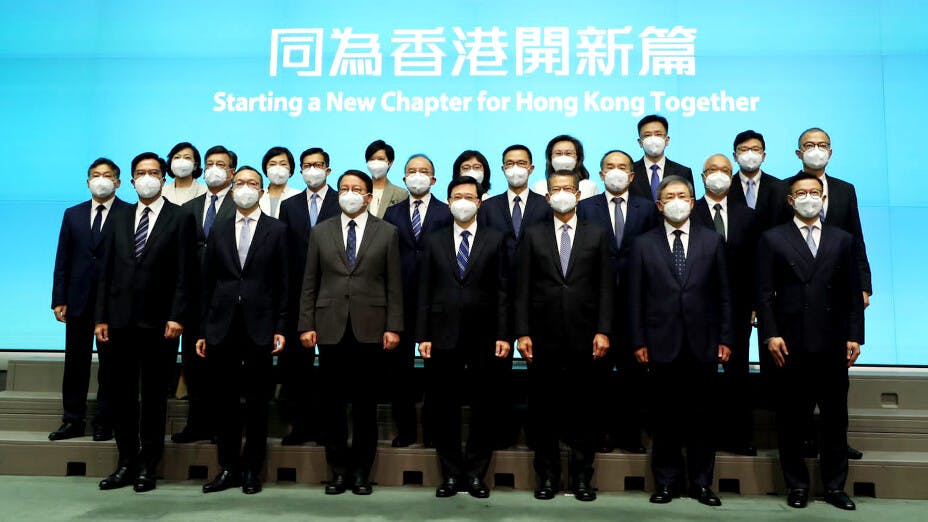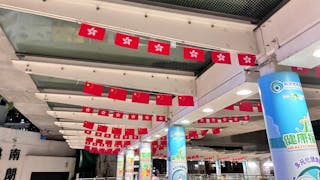從候任行政長官李家超委任的司局長和行政會議成員來看,7月1日起,新一屆特區政府將呈現出一種獨特的模式,即更新以愛國者組成的立法會、以保安官員為主組成的管治班子,留住政務官出任政策職位,並善用行政會議成員的豐富經驗。
司局長人選考慮延續性
6月19日,國務院批准任命26名主要官員,其中包括15名局長和6名正副司長,3人分別擔任政務司司長、律政司司長、財政司司長3個重要職務。政務司司長由現任行政長官辦公室主任陳國基擔任,而他的政務司副司長則是創新及科技局前常任秘書長卓永興;律政司司長為大律師公會前主席林定國,副司長則為民建聯前副主席張國鈞。國務院批准任命後,張國鈞立即退出民建聯;財政司司長陳茂波則留任,他的新副司長是現任發展局局長黃偉綸。
15位政策局局長如下:食物及衛生局局長盧寵茂(現任香港大學深圳醫院院長);創新及科技局局長孫東教授;民政暨青年事務局局長麥美娟(現任工聯會立法會議員);發展局局長甯漢豪(現任發展局常任秘書長);公務員事務局局長楊何蓓茵(現任公務員事務局常任秘書長);環境及生態局局長謝展寰(現任環境局副局長);教育局局長蔡玉蓮(現任教育局副局長);房屋局局長何永賢(現任建築署署長);運輸及物流局局長林世雄(發展局前常任秘書長);商務及經濟發展局局長丘應樺(大灣區航空前行政總裁);勞工及福利局局長孫玉涵(現任勞工處處長);文化體育及旅遊局局長楊潤雄(現任教育局局長);保安局局長鄧炳強(留任);政制及內地事務局局長曾國衛(留任),以及財經事務局局長許正宇(留任)。
鄧炳強留任保安局局長,顯示他肩負了《基本法》23條立法及制訂網絡安全法的重要任務;曾國衛和許正宇留任,則可在一定程度上保證了行政和人事的延續性。
延續性是新局長和副局長人選的關鍵特徵。5位前任或現任高級公務員──甯漢豪、楊何蓓茵、何永賢、林世雄和孫玉菡──被提升為主要官員,這種模式顯示了高級公務員的延續性很重要。
「新香港人」孫東教授掌創科發展
值得一提的是,城市大學的孫東教授獲新政府聘任,負責創新科技的發展。孫教授在內地出生,先後在香港和加拿大接受教育。他於2021年12月通過選舉委員會當選為立法會議員。他的任命被本港傳媒視為新一屆政府的「新香港人」。 從另一個角度來看,在香港與大灣區更緊密的經濟融合中,孫教授可能會在引領創新科技發展方面發揮關鍵作用。
有意思的是,大灣區航空公司前行政總裁丘應樺獲委任為商務及經濟發展局局長,此舉暗示商業和經濟發展將由私人機構的前高管推動,一旦新冠病毒在未來幾年逐漸消失,香港經濟融入大灣區將成為特區政府政策的重點。
一些本港傳媒指出,李家超政府中有相當數量的保安官員。26名主要官員中有8名有紀律部隊背景:入境事務處前處長陳國基、警務處前處長鄧炳強、入境事務處前處長曾國衛、1981至1984年曾任警務督察3年的卓永興、海關關長何珮珊、警務處處長蕭澤頤、入境事務處處長歐嘉宏、懲教署前署長胡英明將任廉政專員。如果把行政長官李家超也計算在內,新一屆特區政府27名最高級官員中,有9人或三分之一在過去或現在有紀律部隊背景。這樣的安排肯定是為了維護中央政府在香港最關心的國家安全。

麥美娟首務贏回青年的心
然而,任命麥美娟為民政及青年事務局局長,是否能夠非常有效地處理她的職務,仍有待觀察。據報道,麥美娟對行政長官林鄭月娥處理2019年修訂逃犯條例爭議的方式持批評態度,她在政治上直言不諱。她的新任務將包括對地區行政的重要檢討,包括委任席位是否會重新注入18個區議會,以及如何重新贏得一些香港年輕人的信任。贏回年輕人的心,將是新一屆特區政府的主要目標之一。 在這方面,麥美娟的工作將與蔡若蓮的工作具有同樣重要的意義。
6月22日,新一屆行政會議成員的名單公布,所委任的16名行政會議成員中,9名是林鄭月娥政府的行政會議成員,7名是新成員,來自新民黨的葉劉淑儀將任召集人。作為立法會議員,她可能在行政會議和立法會之間架起一座重要的橋樑。新一屆行政會議有3名港區全國政協委員,分別是恒生銀行前行政總裁梁高美懿、食物及衛生局前局長高永文和律師陳清霞。這一安排意味着全國政協的核心香港委員將在向政府提供建議方面發揮關鍵作用,而梁高美懿、高永文和陳清霞在銀行界、醫療界和法律界的專業知識將得到發揮。
行政會議人選彰顯重視經驗
3名立法會議員將加入新的行政會議──民建聯的陳克勤接替張國鈞;工聯會的吳秋北和保險界立法會議員陳建波(他將辭去立法會財委會主席一職)。
另外,新任行政會議成員還包括曾任保險業監管局主席、現為恒生大學校委會主席的鄭慕智。他的法律和保險知識肯定會對行政會議有幫助。
其他再次獲得委任的行政會議成員,包括香港大學校委會前主席李國章、金融管理局前總裁任志剛、資深大律師湯家驊,以及兒科醫生、安老事務委員會主席林正財。顯然,李家超在選擇密切的政策顧問時,非常重視一定程度的延續性。
李家超又試圖巧妙地平衡親政府團體的代表性,除了新民黨的葉劉淑儀,還保留了經民聯的林建鋒、自由黨的張宇人、鄉議局的劉業強和建制派召集人廖長江,加上民建聯的陳克勤和工聯會的吳秋北,充分保障了親政府團體的代表性。
本港傳媒指出,李家超的行政會議成員平均年齡為66歲,而林鄭月娥的行政會議成員平均年齡為62歲,梁振英的行政會議成員平均為58歲。行政會議成員的經驗對李家超至關重要,提高了行政會議成員在公共衛生、銀行業和保險業等多個政策領域的專業知識。
總的來說,李家超新政府的司長、副司長和行政會議成員的陣容,顯示了幾個突出的特點──與安全相關的官員將在重要崗位上發揮關鍵作用,維護北京中央政府和香港特別行政區的國家安全利益;資深公務員被提升到局長的重要政策職位,消弭了政務官在政治上不再重要的流言;行政會議成員是社會上和各個職業領域經驗豐富的傑出人士,為政府提供最佳的政策建議和貢獻。李家超政府餘下的挑戰,是在他提出「以結果為目標」的執政理念中設定目標,並以具效率和有效能的方式實現目標,和諧地解決社會矛盾,為一國兩制在香港另一個25年的開始鋪平道路。
An Analysis of John Lee’s Ministers and Advisers
Judging from the appointment of Chief Executive-designate John Lee’s ministers and advisers, the new Hong Kong government’s beginning from July 1 will be characterized by a unique model of renewing a representative governing coalition, relying on security-oriented chief officials, retaining career bureaucrats in policy portfolios, and utilizing the rich experience of Executive Council (ExCo) members.
On June 19, the State Council approved the appointment of twenty-six principal officials, including the secretaries of fifteen bureaus and six secretaries and undersecretaries in the three key positions: Chief Secretary for Administration, Secretary for Justice, and Financial Secretary. The Chief Secretary is filled by Eric Chan, a former director of the Chief Executive’s Office, and his Undersecretary for Administration is the former permanent secretary for innovation and technology Cheuk Wing-hing. The Secretary for Justice is former Bar Association chair Paul Lam Ting-kwok and his undersecretary is Horace Cheung Kwok-kwan, a former vice-chair of the Democratic Alliance for Betterment and Progress of Hong Kong (DAB). Cheung withdrew from the DAB immediately after the appointment was approved by the State Council. Financial Secretary Paul Chan remains in the same position and his new undersecretary is the former Development Secretary Michael Wong Wai-lun.
The fifteen policy secretaries are as follows: Secretary for Food and Health Lo Chung-mau (former chief executive of the University of Hong Kong-Shenzhen Hospital); Secretary for Innovation and Technology Professor Sun Dong; Secretary for Home and Youth Affairs Alice Mak Mei-kuen (former vice-chairperson of the Federation of Trade Unions); Secretary for Development Bernadette Linn Hon-ho (former permanent secretary of development); Secretary for Civil Service Ingrid Yeung Ho Poi-yan (former permanent secretary for civil service); Secretary for Environment and Ecology Tse Chin-wan (former undersecretary for environment bureau); Secretary for Education Choi Yuk-lin (former undersecretary for education); Secretary for Housing Winnie Ho Wing-yin (former director of architectural services); Secretary for Transport and Logistics Lam Sai-hung (former permanent secretary for development); Secretary for Commerce and Economic Development Algernon Yau Ying-wah (former chief executive officer of Greater Bay Airlines); Secretary for Labour and Welfare Chris Sun Yuk-han (former commissioner for labour); Secretary for Culture, Sports and Tourism Kevin Yeung Yun-hung (former secretary for education); Secretary for Security Chris Tang Tang Ping-keung; Secretary for Constitutional and Mainland Affairs Erick Tsang Kwok-wai; and Secretary for Financial Services Christopher Hui Ching-yu.
Chris Tang will remain in the same position as the last phase of the Carrie Lam government – a sign obviously pointing to the important tasks of legislating on Article 23 of the Basic Law and preparing the Internet Security Law. Erick Tsang and Christopher Hui remain in their positions to provide some degrees of administrative and personnel continuities.
Continuity is the key feature of the new line-up of secretaries and undersecretaries. Five former senior and career civil servants – Bernadette Linn, Ingrid Yeung, Winnie Ho, Lam Sai-ho, Chris Sun – were promoted as principal officials and this pattern demonstrated the continuing importance of senior bureaucrats.
It is noteworthy that Professor Sun Dong from City University has been recruited into the new government to deal with the development of information technology. Sun was born in the mainland and educated in both Hong Kong and Canada. He was elected to the LegCo through the Election Committee in December 2021. His appointment was regarded by the local media as a “new Hongkonger” recruited into the new administration. From another perspective, Sun will likely play a key role in spearheading the development of information technology in Hong Kong’s closer economic integration with the Greater Bay Area (GBA).
It is interesting to note that Algernon Yau, the former chief executive officer of the Greater Bay Airlines, was appointed as Secretary for Commerce and Economic Development – a move implying that while commerce and economic development is going to be driven by a former private-sector executive, Hong Kong’s economic integration into the GBA is going to be a policy priority once Covid-19 will gradually fade away in the coming years.
Some local media have highlighted the considerable number of security officials in the John Lee administration. Eight of the 26 principal officials have security-related background: Eric Chan as the former director of immigration, Chris Tang as former police commissioner, Erick Tsang as former director of immigration, Cheung Wing-hing as a former police inspector for three years from 1981 to 1984, Louise Ho Pui-shan as the Commissioner of the Customs and Excise Department, Raymond Siu Chak-yee as the Police Commissioner, Au Ka-wang as the Director of the Immigration Department, and Woo Ying-ming as a former director of Correctional Services Department will become the Commissioner for the Independent Commission Against Corruption. If Chief Executive John Lee is included into the calculation of the new Hong Kong government, nine of the top twenty-seven officials or one-third of them have security background either in the past or the present – an arrangement that will certainly safeguard the central government’s top concern about its national security over Hong Kong.
However, it remains to be seen whether the appointment of Alice Mak as the Secretary for Home and Youth Affairs will deal with her portfolio very effectively. According to news reports, Mak was critical of the way in which Chief Executive Carrie Lam managed the 2019 extradition bill controversy and she was politically outspoken. Her new tasks will embrace the important review of district administration, including whether appointed seats would be reinjected to the 18 District Councils, and how to win back the confidence of some young Hong Kong people. Winning the hearts and minds of the youth will be one of the key targets of the new Hong Kong administration. In this aspect, Mak’s work will be significant together with the portfolio of Choi Yuk-lin.
On June 22, John Lee’s ExCo members were announced. Sixteen ExCo members have been appointed, including nine members continuous from the Carrie Lam administration and seven new members. Regina Ip from the New People’s Party is going to be the convenor. As a legislator, she will likely provide a key bridge between the ExCo and the Legislative Council (LegCo). There are three members of the national committee of the Chinese People’s Political Consultative Conference (CPPCC), namely former Hang Seng Bank executive Margaret Leung Ko May-yee, former Secretary for Food and Health Ko Wing-man and solicitor Eliza Chan Ching-har. This arrangement means that CPPCC’s core Hong Kong members will play a crucial role in advising the government, while the banking, health and legal expertise of Leung, Ko and Chan will be utilized.
Three LegCo members will join the new ExCo: Gary Chan Hak-kan from the DAB and he replaces Horace Cheung; Stanley Ng Chau-pei from the Federation of Trade Unions (FTU) and insurance lawmaker Chan Kin-por (who resigned from LegCo’s Finance Committee chair).
Another new ExCo members include Moses Cheng Mo-chi, who formerly worked as the chair of Insurance Authority and who is now the council chair of the Hang Seng University. His legal and insurance knowledge will surely help the advisory body to the government.
Other reappointed members include former University of Hong Kong council chair Arthur Li Kwok-cheung, former Monetary Authority chief Joseph Yam Chi-kwong, senior counsel Ronny Tong, and paediatric doctor and chair of elderly and health affairs committee Lam Ching-choi. Clearly, some degrees of continuity are cherished by John Lee in his selection of close policy advisers.
John Lee seeks to balance the representation of pro-government groups skilfully. Apart from Regina Ip of the New People’s Party, Lee retains Jeffrey Lam Kin-fung of the Business and Professionals Alliance, Tommy Cheung Yu-yan from the Liberal Party, Kenneth Lau Ip-keung from the rural advisory group Heung Yee Kuk, and Martin Liao Cheung-kong who is a convenor of the pro-establishment camp. Together from Gary Chan of the DAB and Stanley Ng from the FTU, the representation of pro-government groups is fully protected.
The local media has pointed to the higher average age of sixty-six for John Lee’s ExCo compared with 62 percent for Carrie Lam’s ExCo and 58 percent for C. Y. Leung’s ExCo. The experience of advisers is of utmost importance to John Lee, who enhances the expertise of ExCo members in several policy areas such as public health, banking, and insurance.
Overall, the line-up of the secretaries, undersecretaries and ExCo members of the new John Lee government display several prominent features. Security-related officials are going to play a key role in major positions, protecting the national security interests of both the central government in Beijing and the Hong Kong special administrative region. Career bureaucrats have been promoted upward to key policy portfolios as ministers, dispelling the myth that Administrative Officers are no longer politically important. ExCo members are experienced and distinguished people in the community and in various occupational sectors, providing the government with the best policy advise and inputs. The remaining challenges for the John Lee administration are to set the targets in his resulted-oriented governing philosophy and to achieve them with efficiency and effectiveness, tackling the contradictions in the society harmoniously and paving the way for the beginning of another 25 years of the “one country, two systems” in Hong Kong.





































